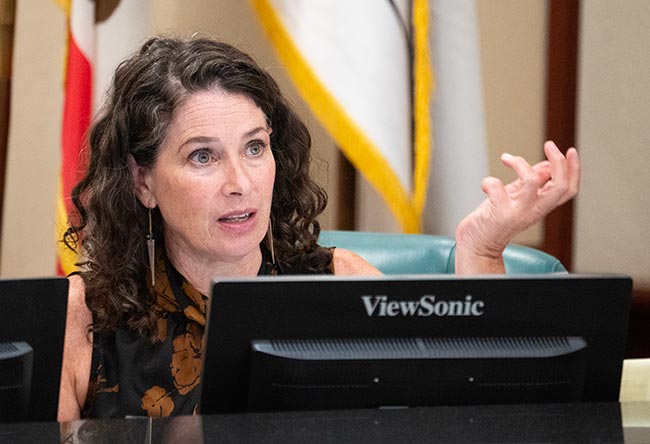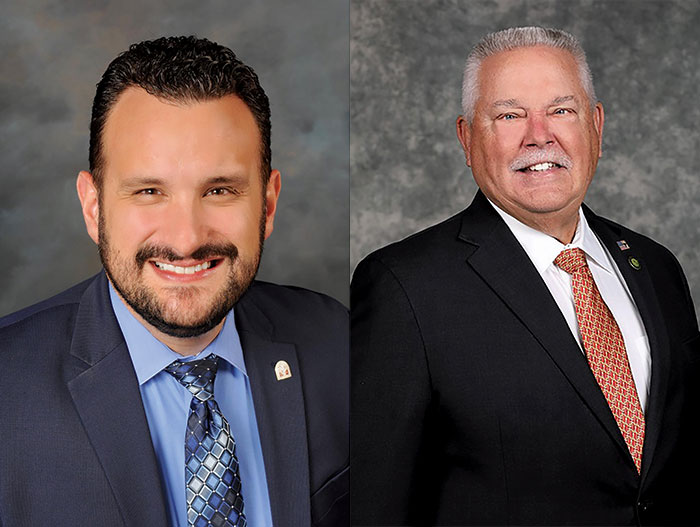Council report: e-bike subsidy program continues, for now

A class one commuter e-bike offered by the GoSGV program. Photo/courtesy of gosgv.com
by Andrew Alonzo | aalonzo@claremont-courier.com
The Claremont City Council voted unanimously Tuesday to allocate $41,250 in American Rescue Plan Act funds to continue supporting the Go San Gabriel Valley E-Bike subsidy program.
Tuesday’s motion — the last notable action from the council before its August recess — authorized City Manager Adam Pirrie to amend the city’s agreement with GoSGV and allocate ARPA funding to continue the program through the end of December. The move will allow 45 waitlisted people to get their hands on an e-bike, bringing the total number of program participants to 165.
However, the approval came with a caveat in that city staff were directed to work with ActiveSGV to measure the program’s effectiveness via a survey of the current and soon to-be users and return data to the council by November to determine if more funding should be allocated for the program, or if it should be suspended or terminated.
The data the city aims to collect includes average mileage, bike usage, and willingness to continue using the bikes should the subsidy program end. ARPA funding designations must be reported to the state by the end of this year and spent by December 2026.
The amendment to staff’s original recommendation to approve $168,000 for the measure came from Council member Ed Reece.
“The data is important,” Reece said. “If we have 45 residents waiting and 10 bikes are just garaged … that’s a significant loss.” Reece asked if there was a way to determine if the e-bikes were being used by owners.
Senior Management Analyst Alex Cousins said GoSGV cannot actively track the e-bikes’ usage, but the program can see the miles traveled once a bike is returned.
“Since the inception of the program there’s been 30 e-bikes returned, and [GoSGV] seen an average of about 50 miles traveled,” said Cousins. “Those were typically held for about two months and most of the reasons residents gave for returning them [were] they weren’t using them enough.”
Cousins later added there’s no way to tell if those on the program’s waitlist are waiting for a bike not being used by a current subscriber.
“I think we need to understand the value of the program and understand that it is making sense,” Reece said. “I just want to make sure that we are using our funds appropriately and most effectively.”
Council member Jed Leano agreed with Reece’s idea that data should fuel the council’s final decision whether to fund the subsidy program.
“I wish we knew that we were subsidizing some level of usage and maybe perhaps we could come up with some creative ways to get that reported data,” Leano said.
The pending survey of users should provide that data.
Reece messaged the Courier after the meeting to further explain his reasoning.
“The council’s understanding of the bike assistance program’s effectiveness and financial viability is crucial as many other programs, like neighborhood park improvements, senior services, and rental assistance, could benefit from these additional funds,” Reece wrote in the text message. “This is to the root of my position. This is the reason why having the data is so important.”
In May 2022 the council agreed to set aside $100,000 in ARPA funding for e-bike programs, according to Cousins. Two programs came about in Claremont the following year in the form of a rebate program that offered up to $1,000 for income eligible residents that purchased an e-bike worth no more than $3,000, and the GoSGV subsidy.
About $40,000 was allocated to the rebate program and the other $60,000 for the subsidy program. All e-bike rebates have been issued since February 2024, according to Cousins.

Claremont City Council member Jennifer Stark during Tuesday’s meeting. Courier photo/Andrew Alonzo
The initial subsidy program launched in September 2022 by ActiveSGV and the SGV Council of Governments. It allowed regional residents the opportunity to check out a class one commuter or cargo e-bike for monthly use. Class one e-bikes are pedal bikes equipped with an electric motor that provides pedal-assist.
While fees vary for users, when ActiveSGV and the city struck a partnership in 2023, Claremonters were able to rent the cargo bikes for $100 per month after putting up a $500 refundable deposit. The pedal-assist commuter e-bikes were available for free after a $250 refundable deposit. Qualified low-income and student participants could make a $125 deposit. Proof of residency is required for all options. Details are at gosgv.com/claremont.html.
“Participation in the program has remained consistent, with approximately 120 Claremont residents renting bikes monthly,” Cousins’ staff presentation read. “The program currently has a waitlist of 45 residents.”
Cousins said the goal of the subsidy program was to provide an alternative mode of transportation while reducing dependance on cars.
No local studies have been made to measure the environmental impact of Claremont’s e-bike programs, but Cousins referenced council to a 2023 analysis by UC Davis’s Institute of Transportation Studies which found “recipients of e-bike incentive programs increased their usage on average from one to three times per month to one to three times per week.” The study also “estimated that each participant reduced between twelve and forty-four kilograms of CO2 [carbon-dioxide] equivalent per month.”
Council member Jennifer Stark said that while the City of Davis in Northern California is flatter than Claremont, making biking easier, the data should not be discounted.
Mayor Sal Medina asked about the level of maintenance the bikes require. Cousins said it was minimal.
After about 45 minutes, the council agreed to increase the funding through December to allow for waitlisted people to participate in the program and conduct the user survey.
Other council items
In a 5-0 vote, the council certified various personnel to the following commissions and committees: for the architectural and preservation commission, John Neiuber was extended two additional years through August 2026 while Lisa Castillo was approved for four more, with her term to expire August 2028. Dirk Silva will continue on the community and human services commission through August 2027.
New members Tim Dunfee and Vickie Noble will serve on the police commission through August 2028. Aundre Johnson will serve through August 2026.
Dylan Arya is the newest member of the traffic and transportation commission and will serve through August 2028. Fresh face Maureen Wheeler will serve on the public art committee until August 2028. Lastly, new member Katie Distelrath will serve on the sustainability committee through January 2028.
The council then voted 5-0 to reaffirm Stark as the voting delegate for the October 18 League of California Cities 2024 Conference and Expo General Assembly meeting. Reece will continue to serve as the alternate voting delegate.
The City Council is dark in August. The next meeting is set for Tuesday, September 10.








0 Comments